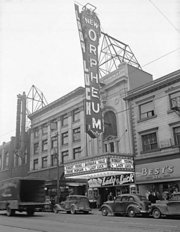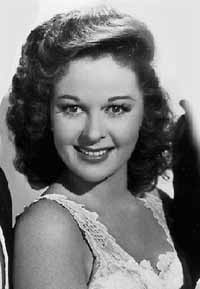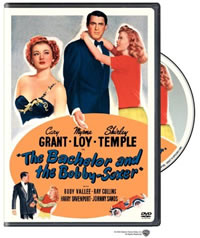Ivan Ackery – The Promoter (Part II)

The Strand, Ivan recalled, had been opened as the Allen Theatre by Mayor R.H. Gale on August 16, 1920. The Allens—Jules and Jay J.—had beaten Famous Players in the race to build Canada’s first super deluxe movie house by almost a year. It was billed as ‘The Theatre Beautiful—Canada’s Finest and most Modern.’ It had been built in six months at a cost of $300,000, with Howard C. Crane as architect and Vancouver’s famous Charles Marega as sculptor. “Within a year the theatre was bankrupt and Dewees and Schuberg bought it for five cents on the dollar. Famous Players later bought a half share in it, then took it over entirely in 1944.”
The first thing Ivan did as manager of the Strand was to get Scott’s Cafe to bake a huge cake, a gigantic confection that stood as tall as a man, to celebrate the theatre’s 14th birthday. Every patron was given a slice of cake during “Birthday Week.” The Fanchon and Marco shows returned, and Vancouver impresario Lily Laverock booked the Ballet Russe de Monte Carlo into the theatre.
Ivan was edging into the Big Time.
And in 1935 he stepped into it. In the summer of ’35 he was informed he was to become manager of the Orpheum Theatre. “It was such a thrill for me, and I can remember how excited my mother got.” His mom’s excitement was justified: the Orpheum was the largest theatre in Canada, and her son was now running it. “I recall how tickled I was because I’d be getting a $10 a week raise!”
Famous Players was getting a lot for that extra 10 bucks a week!
“At the Strand,” Ivan recalled, “I’d had to fill 1,600 seats and deal with a staff of about 25. At the Orpheum I was looking at almost twice that number of seats and much more staff, and I had two important obstacles to overcome—the Depression and the Competition . . . How would I begin? Well, when in doubt, declare a New Policy. It’s sure to catch the interest of the press and the eye of the public. The Vancouver Sun headline read: ‘New Policy at Orpheum,’ and went on to say: “Ivan Ackery, manager of the Orpheum, today announces a new policy for his theatre, which will bring to the Orpheum screen this season some of the greatest films produced. ‘Our new policy,’ Ackery states, ‘brings to our screen this season a parade of the greatest of stars in their best efforts’.”
He doesn’t explain the “new” policy, and one is led to believe—because the head office chose the films—that this is just another example of Ivan’s skill at getting ink. The films he cites, by the way, (Mary of Scotland; Girls’ Dormitory; Charlie Chan at the Race Track; Swing Time; My Man Godfrey and others) are all 1936 productions.
He was now overseeing a staff of 65. There were ten cleaners, four projectionists, two special engineers (presumably for electrical and other technical maintenance), four doormen and two permanent stage hands, and a battalion of usherettes. For big stage shows he’d hire extra stagehands. In the mid-1930s the Orpheum was still putting on stage shows. On November 8, 1935, for example, they presented Major Bowes’ Radio Amateurs. Bowes had a hugely popular radio program in which he showcased up-and-coming talent. In some cases, he’d take the very best on tour. The Orpheum’s ad read “22 Talented Winners In Person On Our Stage—Not a Motion Picture.” One of the 22 was a young singer from Hoboken, New Jersey named Frank Sinatra. Sinatra, 20, and his group, The Hoboken Four, had won Bowes’ contest on one of his shows a couple of months earlier.
There were four cashiers for the two box offices and two night watchmen. No fewer than 35 usherettes were on staff. “These girls,” Ivan recalled, “were very carefully selected and trained to meet and handle the public graciously.” One of them, Gerri Cameron, told the author that “It may sound egotistical, but if you were pretty you pretty much got the job.” Another attribute: you had to learn how to graciously glide down the aisles while showing patrons to their seats. “We were natural blondes, brunettes and redheads,” another of them remembered, “and our hair was worn shoulder length, held back from our faces by little white bows. If a girl didn’t have naturally curly hair, she’d have a permanent wave. We all wore white gloves and had to have clean white collars twice weekly.”
Ivan and his assistant managers wore tuxedos in the evenings. Movie going was an occasion in the gloomy depths of the Great Depression! The opulent surroundings and elaborate costumes were part of the mystique that distracted movie goers from the harsh and grungy reality outside. “It was an escape from the humdrum and horrible things that were happening in real life [in the Depression],” said a former usherette, “and Ivan was the heart of it all. He was so warm and gracious that you’d just feel good when you saw him . . . He brought sunshine into the hearts of people in a very sad, very dreary period in their lives.”
Naturally, because the theatre was so big and the focus of a lot of entertainment, some big names in entertainment would pop up in person from time to time. Ivan delighted in meeting them, even though, as he confessed in his autobiography Fifty Years on Theatre Row, he never really felt totally comfortable in their presence (with a couple of exceptions you’ll learn about.) He said he felt like an impostor, a little uneasy and unsure of why he was in the company of such celebrated folk. It wasn’t a pose. That’s what Ivan was like. As he put it himself, “Even through all my show business years there was always that kind of feeling of being alone in the world.” Nonetheless, he soldiered on.

In 1942 Ivan snared the world premiere of a film titled Forest Rangers. It had a good cast: Fred MacMurray, Paulette Goddard, Susan Hayward . . . and local excitement was high because Susan Hayward would be there in person. There was a drive on to sell War Bonds, and Hayward was involved in it. Ivan was delegated to take her to places where the drive could be promoted. Then there was the movie, too, to sell.
“The night of the opening was really something,” Ivan recalled. “Granville Street was closed to traffic, with bands playing and guards of honor from the Army, Navy and Air Force lining the streets.” Searchlights played over the crowd and the front of the theatre as a police escort brought Hayward to the theatre. Lieutenant-Governor William Woodward, Vancouver’s Mayor Jack Cornett and other VIPs were all in Ivan’s office waiting for her arrival. She was appropriately breathtakingly beautiful upon her arrival, and quite gracious, as well.
But then . . .
“When Miss Hayward arrived in the theatre I escorted her to my office and, my gosh, if she didn’t trip on a step, lose her balance, fall and sprain her ankle. I couldn’t believe it! It was like a bad dream! A 30-piece orchestra was waiting on stage; a full house was anticipating the introduction of this famous lady; but she was now stretched out in my office with her foot on a chair, her complexion about the same shade as her dress, and pain written all over her face. What to do?
“I had the orchestra play another number while we decided, but soon Miss Hayward recovered enough for me to carry her on stage for the introduction, which was all the more appealing to the audience, I’m sure, and I can’t say that I minded it a bit.”
There was a sequel to the Hayward visit. Ivan took her down to the train for her trip back to Los Angeles, and she called out, just as the train was pulling out, “Oh! Ivan! My fur coat! I’ve forgotten my fur coat!” He yelled to her that he would see she got it, rushed back to the hotel to discover the coat in her closet, sped down to Blaine to meet the train there . . . forgetting he’d have customs details to work out. By the time he’d filled out the forms he arrived in Blaine “just in time to wave at Miss Hayward’s train, disappearing into the distance.”
He eventually got the coat back to her.
During World War II Ackery would occasionally put on huge military shows, “put on by as many as 350 soldiers, sailors, airmen and women at one time. The way they sang—and the audience with them—it was a stirring experience.”
No detail escaped Ivan’s attention. On dull nights he made sure the usherettes spread the audience throughout the auditorium. “A lop-sided house looks terrible,” he said. On the opening day of a new film he’d sit through one complete showing. Then he’d meet with the duty projectionist to discuss the running time and the volume of the sound. If the program was too long, he might suggest clipping an item from the newsreel. “If the feature was a drama, I might suggest an increase in the sound volume at just the right moment to give the heroine’s screams maximum effect . . . I emceed most of the shows myself, in the belief that the public enjoyed having their own manager, for the informal atmosphere that gave to the program.”
In his many trips to New York and Hollywood to pick up awards for his promotional efforts Ivan rubbed elbows with a lot of well-known movie personalities: Gene Tierney, Michael Caine, Victor Jory, Alan Ladd, Elizabeth Taylor, Ethel Merman, Bob Hope, George Sanders, Jack Benny . . . but, as mentioned, he never lost the awe he felt when in the presence of major stars.

On at least one occasion, though, he met with one superstar as an equal. “One day [in 1947] we were going onto the set at RKO where The Bachelor and the Bobby Soxer was being made, with Shirley Temple, Myrna Loy, Cary Grant, Rudy Vallee and Ray Collins. The P.R. man went over and told Mr. Grant that I’d said I was from Bristol and knew where his mother was. She’d run a store in Bristol for years, quite close to where my family lived.
“He walked over to me and in that particularly rapid, clipped way of speaking he had, he said, ‘You from Bristol?’
“I replied, ‘O-o-oh, Mister,” in the Somersetshire accent that we both knew so well. ‘I was born right where you went to school.’ He’d attended the Merchant Venturer’s School, about a block away from my home. He’d been born Archie Leach in 1904. I met him several times after that, sometimes in Vancouver, and he was always a very pleasant fellow.”
(A brief digression into trivia: local showbiz buffs will recognize the name Ray Collins, shown above in the credits for The Bachelor and the Bobby Soxer. Collins was born December 10, 1889 in Sacramento, California, and his acting career began when he formed his own theatrical stock company in Vancouver—at age 14! He later ventured into vaudeville and made his way to Broadway and the movies. He’s most well remembered as Lt. Tragg on the TV series Perry Mason, starring New Westminster-born Raymond Burr. And, since Victor Jory’s name is in this article, we should mention he was born in Dawson City, Yukon. Among his nearly 200 movie roles he played Helen Keller’s father in The Miracle Worker.)
Ivan was particularly fond of Gary Cooper, and the tall, lanky star returned that regard. They actually became friends. Cooper came to Vancouver on at least five occasions, and never failed to call on Ivan for drinks and talk. “Coop” wasn’t quite as taciturn as his reputation might indicate.
“The first afternoon Coop called on me,” Ivan recalled, “we went out and spent several hours in one of our local bootleggers exchanging philosophies of life and all those profound things one discusses in an afternoon at the bootleggers. We were joined by Mayor Hume and some fellows from the CBC. Gary was expected at the home of a socially prominent family, but he didn’t want to go.
“By the time we left the bootleggers to return to the theatre, it was time to start the feature. I decided, as was my habit, to first share with the audience the pleasure of a few moments with our visiting celebrity.
“Out onto the stage we waltzed—the stocky Bristolian and the lanky American, full of warmth and good humor. I apologized to our audience for the fact that we were both rather well toasted, and then Gary and I joked with each other and the audience for a few minutes. When we returned backstage, he put his finger beside his nose and in that inimitably mischievous way of his, with his eyes a-twinkle, he said, ‘Ivan—guess what? Your zipper’s undone.’ And, ye gods, he was right!”
There’s a terrific sequel to this tale. It happens that one of the senior staff at the Orpheum was departing that same night and, as was the custom, there was a farewell party. Cooper stayed around “and danced with every girl in the place, including the cleaning ladies whom he sought out for a turn around the lobby.
“Finally,” Ivan continues, “at 4:30 a.m. we meandered out onto Seymour Street, exhausted.” A city street-washing wagon was just then passing, and the driver recognized the actor. “Hello there, Mr. Cooper,” and Coop called out, “Which way are y’ goin’?”
“Down Granville Street,” he replied.
“Could you give us a lift to the Hotel Vancouver?” Coop asked.
“You bet! Climb aboard!” And off they went aboard the water wagon.
In about 1954 Ivan bought a half acre at Copper Cove, “just around the corner from Horseshoe Bay.” It cost him $4,800 and he planned to put a little cabin on it. He lived there for 20 years, until he sold the place in 1974. “I had a beautiful home in a priceless setting, and I loved it. There was lots to occupy my time and my interest. I wasn’t a gardener, but I did the same as I’d done in show business, just learned as I went along, and in time the property became a very beautifully landscaped one, to add to the natural beauty of its surroundings. I built a rockery, with stairs right down to the water, and planted it all myself, after a good deal of investigation and study into which kinds of plants would grow where. It became so attractive, and so popular, that the sightseeing buses used to bring people to see it.”
The weekly children’s matinees at the Orpheum were legendary for the number of kids they attracted. It wasn’t unusual to have more than 5,000 kids attend on a Saturday—in two shifts. Sometimes Ivan would arrange for a short talk by the chief of the fire department or the police. Even the mayor would show up.
And then there was Bambi.
“One of the kids’ favorite performers was Bambi, my little singing chihuahua dog,” Ivan recalled. “I’d discovered that when I would sing to Bambi he’d put his little head back, open his mouth wide, and wail—hardly complimentary, but funny! One day I took him out on stage with me at a matinee and we did a number for the kids. I sang Sweet Adeline, and Bambi went ‘aaaoooo.’ I sang ‘my Adeline,’ and Bambi went ‘aaaoooo.’ My turn: ‘You’re the flower of my heart . . .’ ‘Aaaoooo’—he was interrupting me now, ‘Sweet Adeliiiiiiine.’ The kids just ate it up!
“The act got so popular and got so much press coverage that MacLean’s Magazine decided to send a reporter out to do a story on it. They were to be there, reporter and photographer, on a certain Saturday morning and, believe me, I was excited. This was my big moment as an entertainer, too!
“When the day came, and our time came, all the stage lights were darkened, with only the spot on Bambi and me as we entered and trotted toward stage centre.
“The microphone rose up out of the floor, as usual, and as Bambi reached it he did something he’d never done before on stage—he raised his little leg and thoroughly dampened that mike! I nearly died! The place just went crazy, with 2,800 kids hooting and howling with laughter and the reporter got a story he hadn’t expected—nor had any of us. Talk about being upstaged!”
